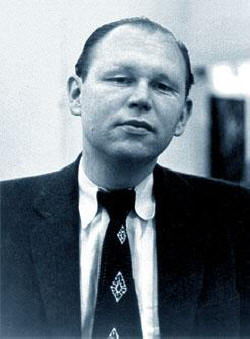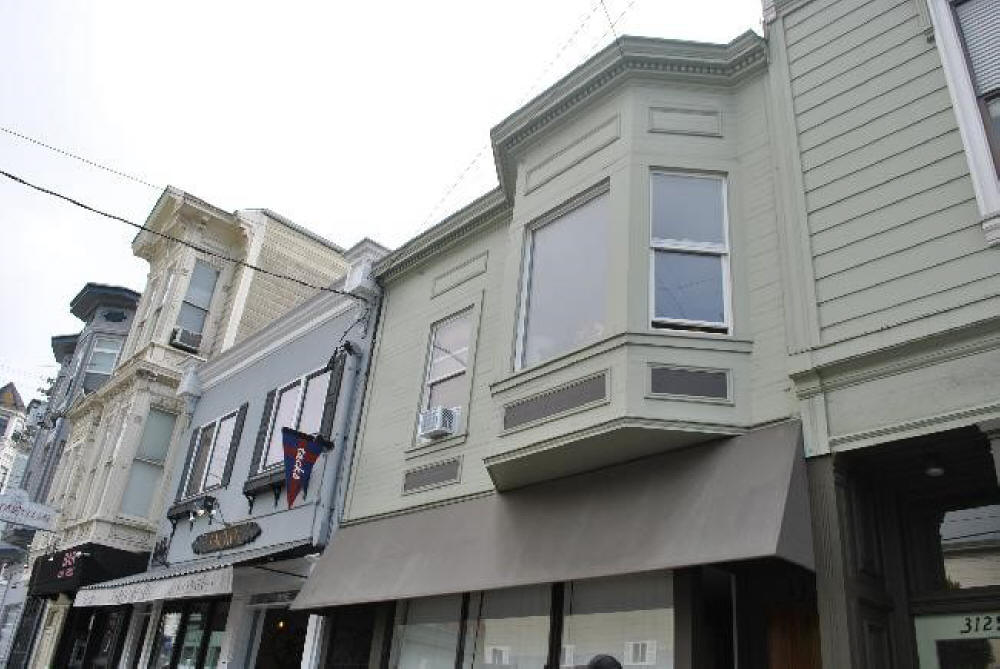Queer Places:
4933 Elmwood Ave, Los Angeles, CA 90004
University of California, 110 Sproul Hall, Berkeley, CA 94720
2029 Hearst Ave, Berkeley, CA 94709
Six Gallery, 3119 Fillmore St, San Francisco, CA 94123
 Jack Spicer (January 30, 1925 – August 17, 1965) was an American poet often identified with the San Francisco Renaissance.[1] In 2009, My Vocabulary Did This to Me: The Collected Poetry of Jack Spicer won the American Book Award for poetry. He spent most of his writing-life in San Francisco.
Jack Spicer (January 30, 1925 – August 17, 1965) was an American poet often identified with the San Francisco Renaissance.[1] In 2009, My Vocabulary Did This to Me: The Collected Poetry of Jack Spicer won the American Book Award for poetry. He spent most of his writing-life in San Francisco.
Born as John Lester Spicer on January 30, 1925 in Pasadena, CA, to parents Dorothy Clause and John Lovely Spicer.[2][3]
He graduated from Fairfax High School in 1942, and attended the University of Redlands from 1943 to 1945.[3] While attending the University of Redlands, he became friends with Warren Christopher.[4] After graduation he lived in Los Angeles briefly, and worked as a movie extra and a private investigator.[4]
Spicer ended up in Berkeley, and lived in a boarding house alongside Philip K. Dick.[4] He spent the years 1945 to 1950; and from 1952 to 1955 at the University of California, Berkeley, where he began writing, doing work as a research-linguist, and publishing some poetry (though he disdained publishing). In 1950, he refused to sign a "loyalty oath" during a time of McCarthyism.[1]
During this time he searched out fellow poets, but it was through his alliance with
Robert Duncan and
Robin Blaser that Spicer forged a new kind of poetry, and together they referred to their common work as the Berkeley Renaissance.[5] The three, who were all gay, also educated younger poets in their circle about their "queer genealogy",
Arthur Rimbaud,
Federico García Lorca, and other gay writers.[6] Spicer's poetry of this period is collected in One Night Stand and Other Poems (1980). His Imaginary Elegies, later collected in Donald Allen's The New American Poetry 1945-1960 anthology, were written around this time.
When the San Francisco poet Robert Duncan met fellow poet Jack Spicer in
1946, one of their first conversations was about
Stefan George’s Maximin cult.
Duncan had been having an affair with
Werner Vordtriede, who had
had childhood connections with the George Kreis. As it happens, Spicer was
studying medieval history with
Ernst Kantorowicz. Spicer saw in Duncan an opportunity to set up an
American version of the Kreis. Duncan moved into a communal household at 2029
Hearst Street, Berkeley, where nocturnal poetry readings and workshops were
soon instituted. On a visit to Berkeley,
E.M. Forster called in on 2029,
but he was unresponsive to the young poets until they served him tea and gin.

Six Gallery
In 1954, he co-founded the Six Gallery in San Francisco, which soon became famous as the scene of the October 1955 Six Gallery reading that launched the West Coast Beat movement.[4] In 1955, Spicer moved to New York City and then to Boston, where he worked for a time in the Rare Book Room of Boston Public Library. Blaser was also in Boston at this time, and the pair made contact with a number of local poets, including
John Wieners,
Stephen Jonas, and Joe Dunn.
John Wieners met Jack Spicer when he returned from Black Mountain College
in 1955. Spicer was working at the Copley Library and skeptical that anyone
was writing decent poetry in Boston. But he soon became fascinated by Stephen
Jonas' work. In the summer of 1956, this group of poets (most of whom were
gay) was living on the back of Beacon Hill where they produced a newsletter
devoted to their writing. In September they gave a public reading but only 8
people showed up. Disgusted, Spicer left Boston in November. Once in San
Francisco, he published Jonas' poetry and Wieners included one of Spicer's
poems in his fist issue of Measure.
Spicer returned to San Francisco in 1956 and started working on After Lorca. This book represented a major change in direction for two reasons. Firstly, he came to the conclusion that stand-alone poems (which Spicer referred to as his one-night stands) were unsatisfactory and that henceforth he would compose serial poems. In fact, he wrote to Blaser that 'all my stuff from the past (except the Elegies and Troilus) looks foul to me.' Secondly, in writing After Lorca, he began to practice what he called "poetry as dictation". His interest in the work of Federico García Lorca, especially as it involved the cante jondo ideal, also brought him near the poetics of the deep image group. The Troilus referred to was Spicer's then unpublished play of that name. The play finally appeared in print in 2004, edited by Aaron Kunin, in issue 3 of No - A Journal of the Arts.
In 1957, Spicer ran a workshop called Poetry as Magic at San Francisco State College,[1] which was attended by Duncan, Helen Adam,
James Broughton, Joe Dunn, Jack Gilbert, and George Stanley. He also participated in, and sometimes hosted, Blabbermouth Night at a literary bar called The Place. This was a kind of contest of improvised poetry and encouraged Spicer's view of poetry as being dictated to the poet.
Spicer refused to have his work copyrighted, and after 1960, Spicer refused to publish his work outside of California.[7] He considered City Lights Bookstore a tourist destination, and boycotted selling his work there.[8] However he failed to be able to hold down a job and after he was poor; by 1964 he started selling books at City Lights.[8]
After many years of alcohol abuse, Spicer fell into a pre-hepatic coma in his apartment building elevator, and later died aged 40 in the poverty ward of San Francisco General Hospital on August 17, 1965.[9]
Spicer's view of the role of language in the process of writing poetry was probably the result of his knowledge of modern pre-Chomskyan linguistics and his experience as a research-linguist at Berkeley. In the legendary Vancouver lectures he elucidated his ideas on "transmissions" (dictations) from the Outside, using the comparison of the poet as crystal-set or radio receiving transmissions from outer space, or Martian transmissions, the radio oracle derived from
Jean Cocteau's film Orphée, often cited by Spicer in his lectures.[10][11] Although seemingly far-fetched, his view of language as "furniture", through which the transmissions negotiate their way, is grounded in the structuralist linguistics of Zellig Harris and Charles Hockett. (In fact, the poems of his final book, Language, refer to linguistic concepts such as morphemes and graphemes). As such, Spicer is acknowledged as a precursor and early inspiration for the Language poets. However, many working poets today list Spicer in their succession of precedent figures.
Since the posthumous publication of The Collected Books of Jack Spicer (1975), his popularity and influence have steadily risen, affecting poetry throughout the United States, Canada, and Europe. The Collected Books of Jack Spicer (1975) started with Spicer works made in and after 1957, and specifically did not include his earlier works per Spicer's requests.[8] Spicer's works created pre-1975 were published in One Night Stand and Other Poems, with Donald Allen as editor.[8]
Other posthumous publications of Spicer's work have taken place including, The Tower of Babel: Jack Spicer's Detective Novel (1994); The House That Jack Built: The Collected Lectures of Jack Spicer (1998), edited by Peter Gizzi; Poet, Be Like God: Jack Spicer and the San Francisco Renaissance (1998) by Lewis Ellingham and
Kevin Killian; My Vocabulary Did This to Me: The Collected Poetry of Jack Spicer (2008) edited by Peter Gizzi and Kevin Killian, which won the American Book Award in 2009;[12] and After Spicer: Critical Essays (2011) edited by John Emil Vincent, a collection of critical essays.
My published books:


BACK TO HOME PAGE

-
Jack Spicer -
Wikipedia
-
Woods, Gregory. Homintern . Yale University Press. Edizione del Kindle.
-
The Hub of the Gay Universe, An LGBTQ History of Boston, Provincetown, and
Beyond, by Russ Lopez, 2019
 Jack Spicer (January 30, 1925 – August 17, 1965) was an American poet often identified with the San Francisco Renaissance.[1] In 2009, My Vocabulary Did This to Me: The Collected Poetry of Jack Spicer won the American Book Award for poetry. He spent most of his writing-life in San Francisco.
Jack Spicer (January 30, 1925 – August 17, 1965) was an American poet often identified with the San Francisco Renaissance.[1] In 2009, My Vocabulary Did This to Me: The Collected Poetry of Jack Spicer won the American Book Award for poetry. He spent most of his writing-life in San Francisco.


